The Mummy Read online
Page 17
"Well, you sound downright cheerful about this! I should have thought you'd be more upset than I am."
"It's unimportant."
"Since when?"
"Since I began to think, really think, about what our lives consist of. Old age and death await us all. And we cannot face that simple truth, so we look for endless distractions."
"Good God, Elliott! You're not talking to Lawrence, you're talking to Randolph. I wish I could share your grand perspective. At the moment I'd sell my soul for one hundred thousand pounds. And so would a lot of other men."
"I wouldn't," Elliott said. "And I don't have one hundred thousand pounds and I never will. If I had it, I'd give it to you."
"You would?"
"Yes, I believe so. But let me take this conversation in another direction. Julie may not wish to be questioned about her friend Mr. Ramsey. She may want some time alone, some real independence. And you might find everything in your hands again."
"You mean this?"
"Yes, and now I'm going home. I'm tired, Randolph. Don't slit your wrists. Drink all you want, but don't do anything so dreadful to all of us. Tomorrow night, come to my house for dinner. I've invited Julie and this mysterious man. Don't fail me. And when it's all over, perhaps we'll have a better idea as to where things stand. You may get everything you want. And I may have the solution to a mystery. Can I count on you for tomorrow night?"
"Dinner, tomorrow night?" Randolph said. "You came here at one in the morning to ask me this?''
Elliott laughed. He set down the glass and stood up.
"No," he said. "I came to save your life. Believe me, it's not worth it, one hundred thousand pounds. Just being alive . . . not being in pain ... but then why try to explain?"
"Yes, don't put yourself out."
"Good night, my friend. Don't forget. Tomorrow night. I'll see myself to the door. Now go to bed like a good man, will you?"
With an electric torch, Samir had led Ramses rapidly through the entire collection. Whatever the King felt, the King did not confess. He studied each large object-mummy, sarcophagus, statue-in turn, barely observing the multitude of tiny relics that filled cases galore.
Their footsteps echoed carelessly on the stone floor. The lone guard, long used to Samir's nocturnal wanderings, left them alone.
"In Egypt are the real treasures," Samir said. "The bodies of the Kings. This is but a fraction of what has been saved from pillage and from time."
Ramses had paused. He was examining a Ptolemaic mummy case, one of those curious hybrid creations which consisted of an Egyptian coffin with a realistic Greek face painted upon it, rather than the stylized mask of earlier centuries. This was the coffin of a woman.
"Egypt," Ramses whispered. "Suddenly I cannot see the present for the past. I can't embrace this age until I have said my farewells to those years completely."
Samir found himself shivering in the dark. The sweet sadness gave way to fear again, a deep silent terror of this unnatural thing which he knew now to be true. There could be no error.
The King turned his back on the Egyptian rooms. "Lead me out, my friend," he said. "I am lost in this maze. I do not like the concept of a museum.''
Samir walked quickly at his side, the beam shining on the floor directly before them.
"Sire, if you desire to go to Egypt, do it now. That is my advice to you, though I know you do not ask it. Take Julie Stratford if you will. But leave England."
"Why do you say this?"
"The authorities know that coins have been stolen from the collection! They want to reclaim the mummy of Ramses the Great. There is much talk and suspicion."
Samir could see the menace hi Ramses' face. "The accursed Henry Stratford," he said under his breath, quickening his pace ever so slightly. ' 'He poisoned his uncle, a man of learning and wisdom. His own flesh and blood. And stole from mat man a golden coin as the body lay dying."
Samir stopped. The shock was more than he could bear. Instantly he knew it was true. He had known when he saw the body of his friend that something was terribly wrong. It had not been a natural death. But he had believed Henry Stratford a coward. Slowly he caught his breath. He looked at the tall shadowy figure standing beside him.
"You tried to tell me this earlier tonight," he whispered. "I didn't want to believe it."
"I saw it, my beloved servant," the King said. "With my own eyes. Just as I saw you come to the body of your friend Lawrence and begin to weep. These things were mixed with my waking dreams; but I remember them most clearly.''
"Ah, but this cannot go unavenged." Samir was trembling.
Ramses placed a hand on his shoulder. They proceeded slowly.
"And this Henry Stratford knows my secret," Ramses said. ' 'The tale he told was true. For when he tried by the same means to take the life of his cousin, I came out of the coffin to prevent it. Oh, if only I had had my full strength, I would have finished it, there and then. I should have embalmed him myself and wrapped him up and put him in the painted coffin for all the world to see as Ramses."
Samir smiled bitterly. "A just reward," he said under his breath. He felt the tears on his face, but there was none of the relief that tears should bring. "And what will you do now, sire?"
"Kill him, of course. For Julie's sake and for my sake. There is no other possibility."
"You wait for the opportunity?"
"I wait for permission. Julie Stratford has the delicate conscience of one unused to bloodshed. She loves her uncle; she shrinks from violence. And I understand her reasoning, but I grow impatient. And angry. I want this Henry to threaten us no more."
"And what of me? I too know your secret now, sire. Will you kill me to protect it?"
Ramses stopped in his tracks. "I don't ask kindnesses of those I mean to harm. But tell me. On your honor, who else knows the truth?"
"Lord Rutherford, the cither of the young man who courts Julie. ..."
"Ah, the one called Alex, with the gentle eyes."
"Yes, sire. The father is a man to be reckoned with. He suspects. More significantly, he may believe, more earnestly even than young Stratford."
"This knowledge is poison! As deadly as the poisons in my tomb. First there will be fascination, then greed, and finally desperation."
They had reached the side door. The rain was coming down. Samir could see it through the thick glass, though he could not hear it.
"Tell me why this knowledge isn't poison to you," Ramses asked.
"I don't wish to live forever, sire."
Silence.
"I know. I can see this. But in my heart of hearts, I don't understand it."
"Strange, sire, that I must give you explanations. You who must know things I shall never know."
"I shall be grateful for the explanation."
"I have found it hard enough to live this long as it is. I loved my friend. I fear for his daughter. I fear for you. I fear to acquire knowledge which I cannot use to any moral purpose."
Again there was a pause.
"You're a wise man," Ramses said. "But don't fear for Julie. I will protect Julie, even from myself."
"Take my advice and leave here. There are wild rumors. And the empty coffin, it will be discovered. But if you are gone, all this will die away. It has to die away. The rational mind cannot have it otherwise."
"Yes. I will go. 1 must see Egypt again. I must see the modern city of Alexandria covering the palaces and streets I knew. I must see Egypt again merely to be done with it, and go on to the modern world. But when, that is the question."
"You'll need papers to travel, sire. In this age, one cannot be a man without an identity. I can obtain those papers for you.'
Ramses considered. Then: "Tell me where I can find Henry Stratford."
"I don't know that, sire. I might kill him myself now, if I did. He lodges with his father when he chooses. He keeps a mistress as well. I urge you to leave England now, and let this revenge wait for a proper moment. Let me get you the documents yo
u need."
Ramses nodded, but this was not a nod of agreement. He was merely acknowledging the generosity of the advice, Samir knew that.
"How do I reward your loyalty, Samir?" he asked. "What do you want that I can give?"
"To be near you, sire. To know you. To hear now and then the smallest part of your wisdom. You have eclipsed the mysteries I loved. You are the mystery now. But I ask nothing, really, except that for your own safety you go. And that you protect Julie Stratford."
Ramses smiled approvingly.
"Get the travel documents for me," he said.
He reached into his pocket and produced a shining gold coin which Samir recognized immediately. He did not need to study the engraving.
"No, sire, I cannot. This is not a coin any longer. It is more. ..."
"Use it, my friend. There are many, many more where it came from. In Egypt I have riches hidden which I myself can no longer measure."
Samir took the coin, though what he would do with it he was not certain.
"I can get what you want."
' 'And for yourself? Whatever is required that you might travel with us?"
Samir felt his pulse quicken. He stared at the King's face, only partially revealed by the gray light through the door.
"Yes, sire, if that's what you wish. I will gladly go with you."
Ramses made a small polite gesture; Samir at once opened the door; Ramses gave him a little bow and passed out into the rain silently.
For a long time, Samir stood there, feeling the cold spray from outside, yet not moving. Then he closed and locked the door. He walked through the dark corridors of the museum until he had reached the front foyer.
A great statue of Ramses the Great stood there as it had for many years, greeting all those who entered the museum.
It had brought only a passing smile from the King. But Samir stared at it, aware that his attitude was one of silent worship.
Inspector Trent sat at his desk at Scotland Yard pondering. It was past two. Sergeant Gallon had long ago gone home. And he himself was tired. Yet he could not stop thinking of all the aspects of this strange case, which now encompassed a murder.
He had never become accustomed to examining corpses. Yet he'd gone to the morgue to see the body of Tommy Sharpies for one very important reason. A rare Greek coin had been found in Sharples's pocket, a coin identical with the "Cleopatra coins'' in the Stratford collection. And there had been a small address book on Sharples's person as well, which contained the name and addresses of Henry Stratford.
Henry Stratford, who had run out of his cousin's house in Mayfair this morning, crying that a mummy had climbed out of its coffin.
Yes, a puzzle.
That Henry Stratford possessed a rare Cleopatra coin would not have surprised anyone. He had tried to sell such a coin only two days ago, that was now almost certain. But why would he have tried to pay his debts with such a valuable piece of gold, and why did me thief who murdered Sharpies not steal it?
Trent would call the British Museum about the coin first thing in the morning. That is, after he hauled Stratford out of bed and questioned him about the murder of Sharpies.
But the whole thing didn't make sense. And then there was the question of the murder itself. Surely Henry Stratford hadn't done it. A gentleman like that could hold off his creditors for months. Beside, he just wasn't the sort to sink a knife into a man's chest, at least Trent didn't think so.
But he wasn't the sort to run screaming from his cousin's house that a mummy had tried to strangle him either.
And then there was another thing. A most disturbing thing. It was the manner in which Miss Stratford had responded when told of her cousin's mad story. She hadn't seemed shocked so much as coldly indignant. Why, the story itself didn't surprise her at all. And then there was that strange gentleman staying at her house and the way that Stratford had stared at him. The young woman had been hiding something, that was clear. Perhaps he should stop by and just have a look about the house, and talk with the guard for a little while.
After all, he wasn't going to get any sleep tonight anyway.
9
THE SMALL hours. Ramses stood in the hallway of Julie's palatial house, observing the intricately carved hands of the grandfather clock move into place. At last the big hand bisected the Roman numeral twelve, and the small hand bisected the Roman numeral four, and the clock began its deep, melodious chime.
Roman numerals. Everywhere he looked he saw them; on cornerstones, in the pages of books; on the facades of buildings. In fact, the art, the language, the spirit of Rome ran through this entire culture, hooking it firmly to the past. Even the concept of justice which so strongly influenced Julie Stratford had come down not from the barbarians who once ruled this place with their crude ideas of revealed law and tribal vengeance, but from the courts and judges of Rome where reason had reigned.
The great banks of the money changers were fashioned like Roman temples. Great marble statues of figures in Roman dress stood in public places. The curiously graceless houses that crowded this street had small Roman columns and even peristyles over the doors.
He turned around and went back into the library of Lawrence Stratford and sat down again in the man's comfortable leather chair. He had placed lighted candles all about this room for his own pleasure, and now it had the very pitch of light he so loved. Of course the little maidservant would faint dead away in the morning when she saw the dripping wax everywhere, but never mind. She would certainly clean it away.
He loved this room of Lawrence Stratford-Lawrence Stratford's books and his desk. Lawrence Stratford's gramophone playing "Beethoven," a medley of squeaky little horns that sounded oddly like a chorus of cats.
How curious that he had taken possession of so much that had belonged to this white-haired Englishman who had broken down the door of his tomb.
All day wearing Lawrence Stratford's stiff and heavy official garments. And now, at ease once again, in Lawrence Stratford's silk "pyjamas" and satin robe. The most puzzling part of modern dress had been the man's leather shoes. Surely human feet were not meant to wear this kind of covering. It was more than a soldier needed to protect him in the heat of battle. Yet even the poor wore these little torture chambers, though some were lucky enough to have worn holes through the leather, making a rough sandal of sorts so their feet could breathe.
He laughed at himself. After all he had seen today, he was thinking of shoes. His feet didn't hurt anymore. So why not forget it?
No pain ever stayed with him very long; or any pleasure. For example, he smoked Lawrence Stratford's delicious cigars now, drawing in the smoke slowly, so that it made him dizzy. But the dizziness went away at once. So it was with the brandy as it always had been. He experienced drunkenness only for an instant, when he first swallowed and the delicious heat of the drink was still in his chest.
His body simply threw off the effects of things. Yet he could taste and smell and feel. And the strange tinny music winding out of the gramophone gave him so much pleasure that he felt he might start weeping again.
So much to enjoy. So much to study! Since coming back from the museum, he had torn through five or six books in the library of Lawrence Stratford. He had read complex and exhilarating discussions of the "Industrial Revolution." He had dabbled a bit in the ideas of Karl Marx, which were sheer nonsense, as far as he could see. A rich man, it seemed, writing about poor men when he did not know how their minds worked. He had reexamined the world globe many times as he memorized the names of continents and countries. Russia, now that was an interesting country. And this America was the greatest mystery of all.
Then he had read Plutarch, the liar! How dare the bastard say that Cleopatra had tried to seduce Octavian, her last conqueror. What a monstrous idea! There was something about Plutarch which made him think of old men gossiping as they gathered on benches in public squares. No gravitas to the history.
But enough. Why think about that! There was a sudden confu
sion in him. What troubled him, made him a little afraid?
Not all the wonders he'd discovered in this twentieth-century world since morning; not the coarse abrasive English language, which he had mastered before afternoon; not the length of time (hat had passed since he'd closed his eyes. What troubled him was this entire question of the way his body constantly restored itself-wounds healing; cramped feet relaxing; brandy having little or no effect.
It was troubling him because for the first time in all his long existence he was beginning to wonder if his heart and mind were not subject to some similar system of uncontrollable renewal. Did mental pain leave him as easily as physical pain?
Not possible. Yet if that was not so, why hadn't his litde trip to the British Museum made him cry out in agony? Numb and silent, he had walked among mummies and sarcophagi and manuscripts stolen from all the dynasties of Egypt even to the time in which he had retreated from Alexandria to his last tomb in the Egyptian hills. Yet Samir had been the one who suffered, beautiful golden-skinned Samir, whose eyes were black as Ramses' had once been. Great Egyptian eyes, those, the same after countless centuries. Samir, his child.

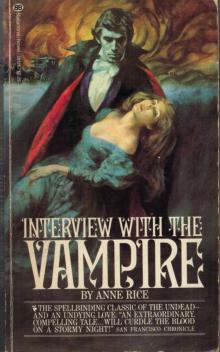 Interview with the Vampire
Interview with the Vampire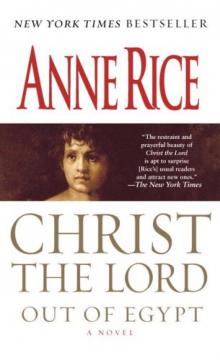 Christ the Lord: Out of Egypt
Christ the Lord: Out of Egypt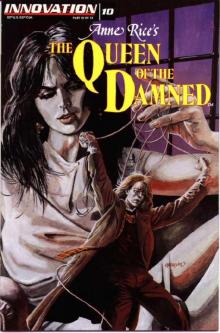 The Queen Of The Damned
The Queen Of The Damned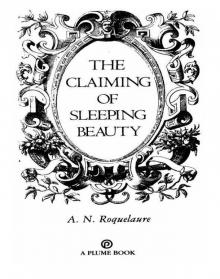 The Claiming of Sleeping Beauty
The Claiming of Sleeping Beauty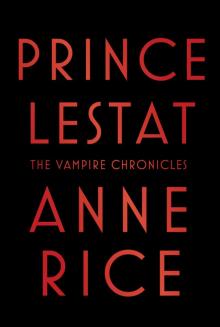 Prince Lestat
Prince Lestat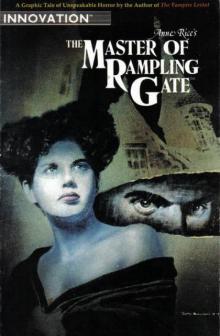 The Master of Rampling Gate
The Master of Rampling Gate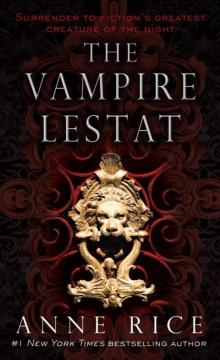 The Vampire Lestat
The Vampire Lestat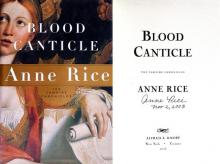 Blood Canticle
Blood Canticle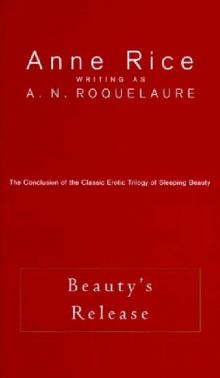 Beauty's Release
Beauty's Release Pandora
Pandora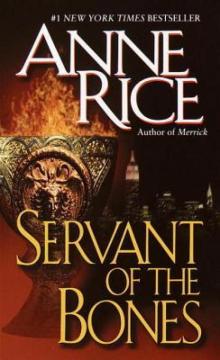 Servant of the Bones
Servant of the Bones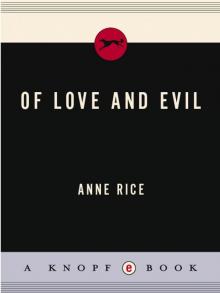 Of Love and Evil
Of Love and Evil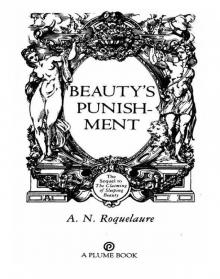 Beauty's Punishment
Beauty's Punishment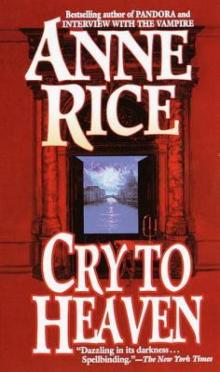 Cry to Heaven
Cry to Heaven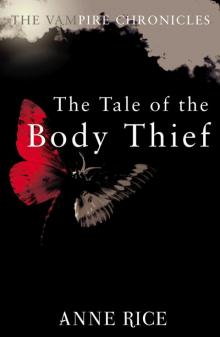 The Tale of the Body Thief
The Tale of the Body Thief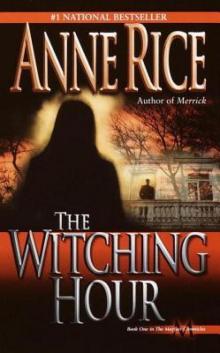 The Witching Hour
The Witching Hour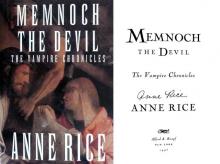 Memnoch the Devil
Memnoch the Devil Blackwood Farm
Blackwood Farm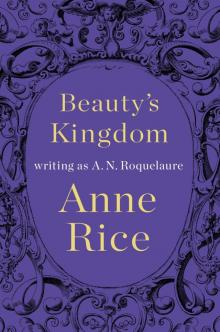 Beauty's Kingdom
Beauty's Kingdom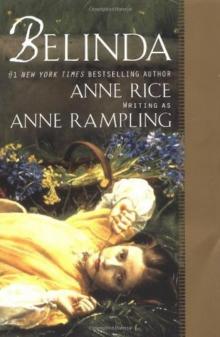 Belinda
Belinda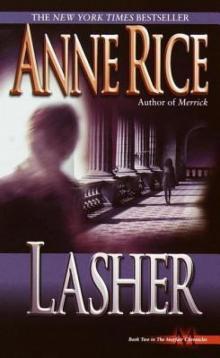 Lasher
Lasher Vittorio, the Vampire
Vittorio, the Vampire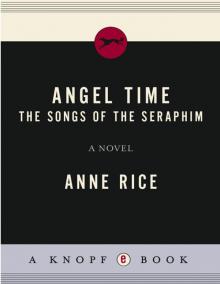 Angel Time
Angel Time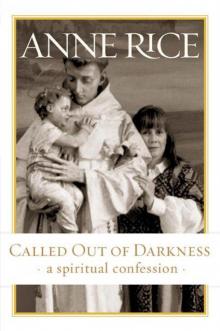 Called Out of Darkness: A Spiritual Confession
Called Out of Darkness: A Spiritual Confession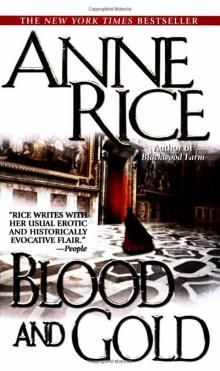 Blood And Gold
Blood And Gold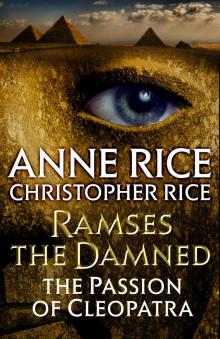 The Passion of Cleopatra
The Passion of Cleopatra Taltos
Taltos Exit to Eden
Exit to Eden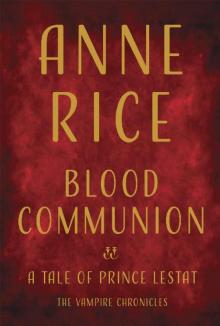 Blood Communion (The Vampire Chronicles #13)
Blood Communion (The Vampire Chronicles #13) The Wolf Gift
The Wolf Gift The Wolves of Midwinter
The Wolves of Midwinter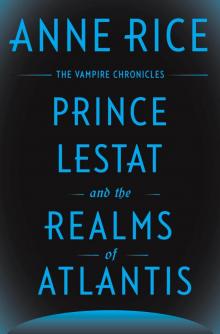 Prince Lestat and the Realms of Atlantis
Prince Lestat and the Realms of Atlantis The Ultimate Undead
The Ultimate Undead The Vampire Lestat tvc-2
The Vampire Lestat tvc-2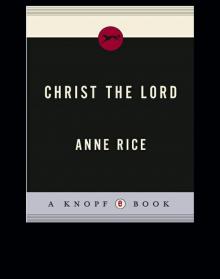 The Road to Cana
The Road to Cana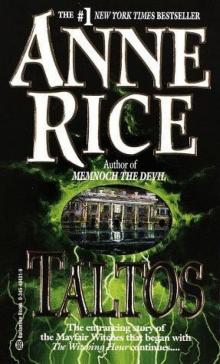 Taltos lotmw-3
Taltos lotmw-3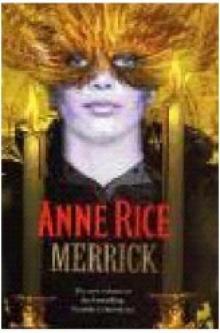 Merrick tvc-7
Merrick tvc-7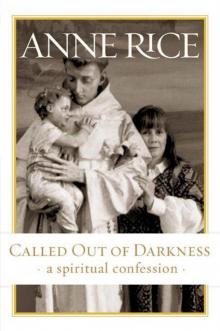 Called Out of Darkness
Called Out of Darkness Pandora - New Vampires 01
Pandora - New Vampires 01 Bllod and Gold
Bllod and Gold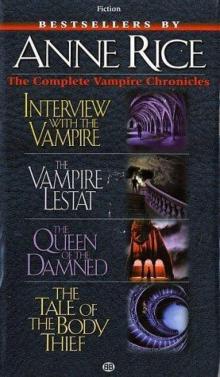 The Queen Of the Damned: Vampire Chronicles
The Queen Of the Damned: Vampire Chronicles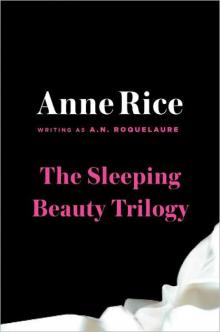 The Sleeping Beauty Trilogy
The Sleeping Beauty Trilogy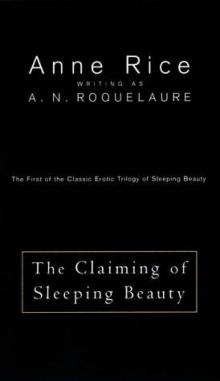 The Claiming of Sleeping Beauty b-1
The Claiming of Sleeping Beauty b-1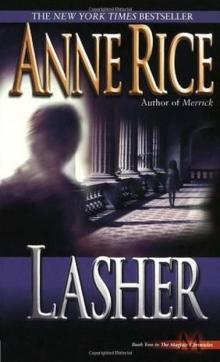 Lasher lotmw-2
Lasher lotmw-2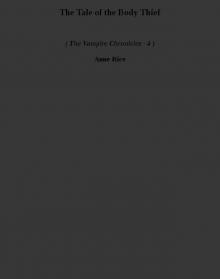 The Tale of the Body Thief tvc-4
The Tale of the Body Thief tvc-4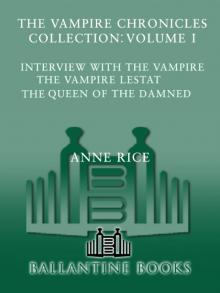 The Vampire Chronicles Collection
The Vampire Chronicles Collection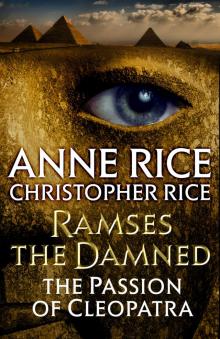 Ramses the Damned
Ramses the Damned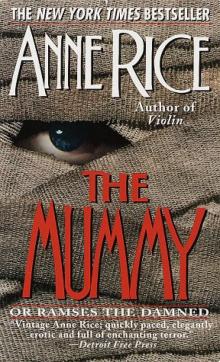 The Mummy - or Ramses the Damned
The Mummy - or Ramses the Damned Vittorio, The Vampire - New Vampires 02
Vittorio, The Vampire - New Vampires 02 The Vampire Armand tvc-6
The Vampire Armand tvc-6 Queen of the Damned tvc-3
Queen of the Damned tvc-3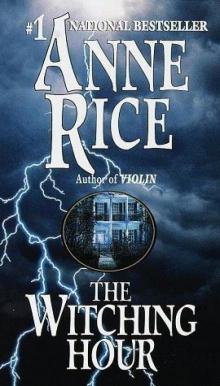 The witching hour lotmw-1
The witching hour lotmw-1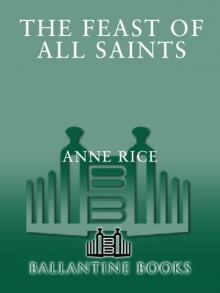 Feast of All Saints
Feast of All Saints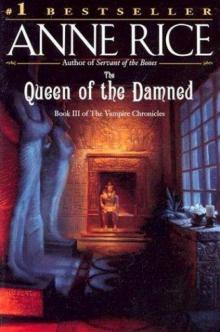 Queen of the Damned
Queen of the Damned The Wolves of Midwinter twgc-2
The Wolves of Midwinter twgc-2 The Mummy
The Mummy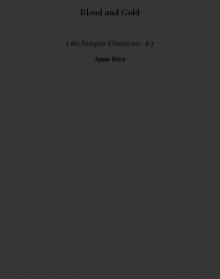 Blood and Gold tvc-8
Blood and Gold tvc-8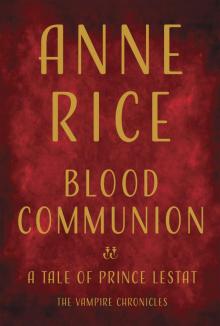 Blood Communion
Blood Communion Interview with the Vampire tvc-1
Interview with the Vampire tvc-1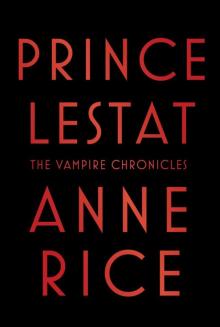 Prince Lestat: The Vampire Chronicles
Prince Lestat: The Vampire Chronicles